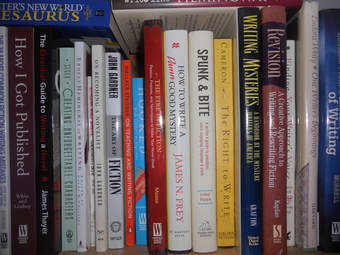 I encourage people to write. They can do journals, diaries, poems, speeches, fiction, nonfiction, memoirs, etc., but putting down words increases people’s ability to articulate what they think and, consequently, how to say better what they think. That benefits everybody. I’m going to share my own writing experiences, but don’t think that I consider myself a good writer. I’ve been writing fiction a long time and have produced a number of short stories and self-published books, so I have capabilities. I have abundant imagination, I have sufficient knowledge of grammar and English prose structure, I’ve got a good vocabulary, I’ve read enough good writers to know who and what to imitate, I know story fundamentals, I’ve experienced good times and bad times, I know what scares me, and I know what excites me. I really, really enjoy reading books and I have a passion to share good stories with people. The books I’ve written are good and I’m proud of them, but it might have taken fifteen to twenty full rewrites on some of them to get to a final product, and that was disappointing. I felt clumsy and amateurish with the fundamentals of writing my stories: I was working way too hard, improving way too slowly, and felt my stories were not as good as they should have been; I had some skills but needed correction and direction. At the beginning of 2013, as I introduced in my last blog post, I devoted myself to one full year of learning to write better. I did not feel alone in what I wanted. Attend any writers’ conference and you’ll find that most attendees are looking for some level of inspiration or salvation. The talks and presentations offer common instruction or advice: attend classes on every aspect of writing, editing and publishing, read good books, read how-to-write books, find partners to write with, find writing groups to join, find readers to give feedback, take college writing courses or literature courses, find online writing courses or courses on CDs or DVDs, follow blogs, subscribe to writing magazines, submit, submit, submit, attend more conferences, attend workshops, mentor students, teach classes, go on writing retreats, and other activities. I had already done a number of those, with dubious results probably due to my typically bad attitude due to my typically big ego, so I tried to be honest with creating goals for my year of learning. Of all that I needed to do, I would focus first on writing good sentences and paragraphs. Specifically, I would read good writers (fiction or nonfiction) and write down sentences and paragraphs that impressed me. I thumbtacked the excerpts on the wall behind my desk. Every day, I read those words and asked “why do they sound so good?” One of my first books was The Orchardist, by Amanda Coplin. I’d never heard of her but she writes sentences like a poet. I reread A Separate Peace by John Knowles; it’s full of passages that effortlessly sweep the reader along. Larry McMurtry can’t be beat for revealing a character’s thoughts. Ann Patchett, John Steinbeck, Ann Lamott, Jeanette Walls, John Nichols, Norman and John McLean, Harper Lee, Wallace Stegner – they all wrote well-crafted sentences and damned-near-inspiring paragraphs. When I found someone to admire, I’d read their book, copy out sentences and paragraphs, and add their words on the wall. How did they choose those words? What was the author doing that I wasn’t? Why did they structure the sentences that way? How did their words carry the story? Why does it seem so simple? I soon ran out of space on my wall, but it was enough to show a pattern: the excerpts on my wall used sentences that had a connectiveness of thought and a strength of presentation that mine did not. The words those authors put together flowed like rain; my words dripped like a faucet. Okay, so there was something there to learn. Another good thing I did was to read how-to-write-books books. I found three categories of those kinds of books, the first being concerned with story mechanics – idea, plot elements, scenes, transitions, characters, color, sound, pace, character arc, beginning, middles, ends, power words, power sentences, flow, suspense, tension, drama, vocabulary, sentence structure, etc. The second category dealt with the writer-on-the-inside – do you understand the story that you want to communicate? Do you write honestly? Are you revealing yourself? Are you saying what you want to say? How do you know? What’s the center of your passion? Are you grounded? What do you want people to learn from your words? How do you manage yourself as a writer? The third was witness-based – stories from successful writers and authors about what they had written and what they learned as they moved through their writing careers. Where did they begin, how did they learn their craft, what did they do to refine their craft? What do they think is important about writing? I started with the third category and it was good place for me. I was encouraged to hear their stories and adventures. All of them had things to learn, too.
0 Comments
Leave a Reply. |
AuthorDon Willerton has been a reader all his life and yearns to write words like the authors he has read. He's working hard at it and invites others to share their experiences. |

 RSS Feed
RSS Feed